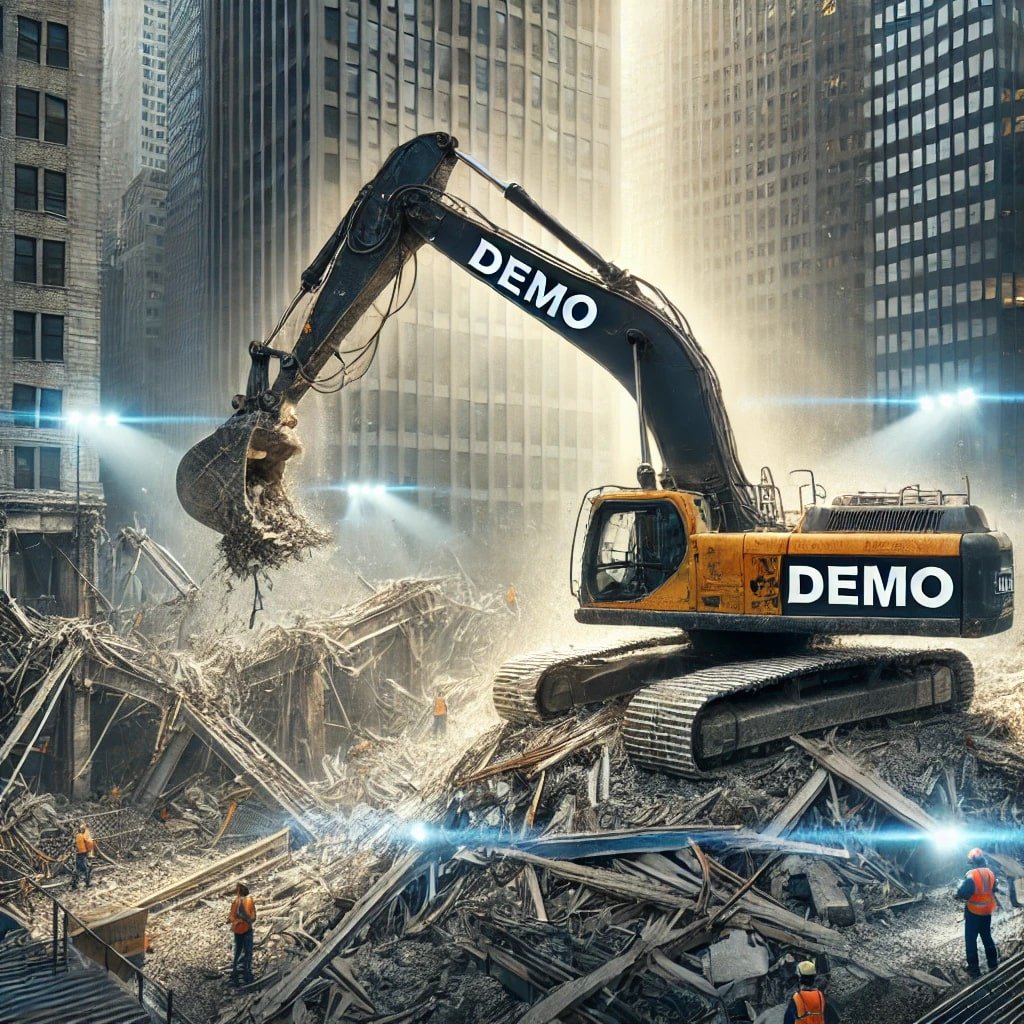Demolition is an essential aspect of urban development, whether it’s to make way for new construction or to remove unsafe structures. Among the various methods and tools available for demolition, excavators stand out as the most efficient, versatile, and safe option. Here’s a comprehensive look at why using an excavator for demolition is the best choice.
1. Efficiency and Speed
High Productivity:
-
Excavators are designed to handle heavy loads and can operate continuously for long periods. This high productivity means that demolition projects can be completed much faster compared to manual methods or smaller machinery.
Advanced Attachments:
-
Modern excavators come with a range of attachments like hydraulic breakers, crushers, and shears. These attachments make it possible to tackle different materials, such as concrete, steel, and wood, with ease. This versatility ensures that all parts of a structure can be efficiently demolished.
2. Safety
Operator Safety:
-
Excavators allow operators to control demolition from a safe distance, reducing the risk of injury from falling debris. The enclosed cab provides protection against dust, noise, and vibrations, ensuring a safer working environment.
Precision:
-
The advanced hydraulics and maneuverability of excavators enable precise demolition. This precision minimizes the risk of accidental damage to surrounding structures and ensures controlled dismantling of buildings, enhancing overall site safety.
Remote Control Options:
-
Some excavators are equipped with remote control capabilities, allowing operators to handle particularly hazardous tasks from a distance, further improving safety.
3. Versatility
Wide Range of Applications:
-
Excavators are suitable for a variety of demolition tasks, from tearing down residential buildings to dismantling large industrial structures. Their ability to switch between different attachments makes them adaptable to any demolition scenario.
Selective Demolition:
-
In projects where certain parts of a building need to be preserved or salvaged, excavators excel. They can carefully dismantle specific sections without causing unnecessary damage, facilitating the reuse of materials and reducing waste.
Tight Spaces:
-
Compact excavators are available for projects in tight urban spaces where larger machinery cannot operate. These smaller machines maintain the power and efficiency of their larger counterparts while being able to navigate restricted areas.
4. Cost-Effectiveness
Reduced Labor Costs:
-
The use of excavators significantly reduces the need for manual labor, which lowers labor costs. A single operator can accomplish the work of many laborers, leading to substantial savings.
Lower Maintenance Costs:
-
Modern excavators are built for durability and require minimal maintenance. With regular upkeep, they can operate efficiently for many years, making them a cost-effective investment for demolition companies.
Fuel Efficiency:
-
Advances in engine technology have made excavators more fuel-efficient, reducing operational costs and environmental impact. Lower fuel consumption translates to cost savings over the duration of a project.
5. Environmental Benefits
Waste Management:
-
Excavators equipped with sorting attachments can separate materials during demolition, facilitating recycling and reducing landfill waste. This capability aligns with sustainable construction practices and environmental regulations.
Reduced Emissions:
-
Newer models of excavators are designed to meet stringent emissions standards. Using these machines helps reduce the carbon footprint of demolition activities, contributing to greener construction practices.
Noise Reduction:
-
Excavators are generally quieter than traditional demolition methods like wrecking balls or jackhammers. This reduction in noise pollution is beneficial, especially in urban areas where noise regulations are strict.
6. Advanced Technology
Telematics:
-
Modern excavators come with telematics systems that provide real-time data on machine performance, fuel usage, and maintenance needs. This data helps operators and fleet managers optimize efficiency and reduce downtime.
GPS and Automation:
-
GPS technology and semi-automation features enable precise control and positioning of excavators. These advancements enhance accuracy in demolition tasks and improve overall project management.
Remote Monitoring:
-
Remote monitoring systems allow supervisors to oversee multiple demolition sites simultaneously, ensuring that projects stay on schedule and adhere to safety protocols.
Conclusion
Using an excavator for demolition is undoubtedly the best option due to its efficiency, safety, versatility, cost-effectiveness, environmental benefits, and advanced technology. Excavators have revolutionized the demolition industry, making it possible to complete projects quickly, safely, and sustainably. As technology continues to evolve, excavators will only become more advanced, further solidifying their status as the premier choice for demolition tasks.
For any demolition project, whether large or small, relying on an excavator ensures a smooth, efficient, and safe process. Embracing this powerful machinery not only enhances productivity but also supports sustainable building practices, paving the way for a greener and more efficient construction industry.






